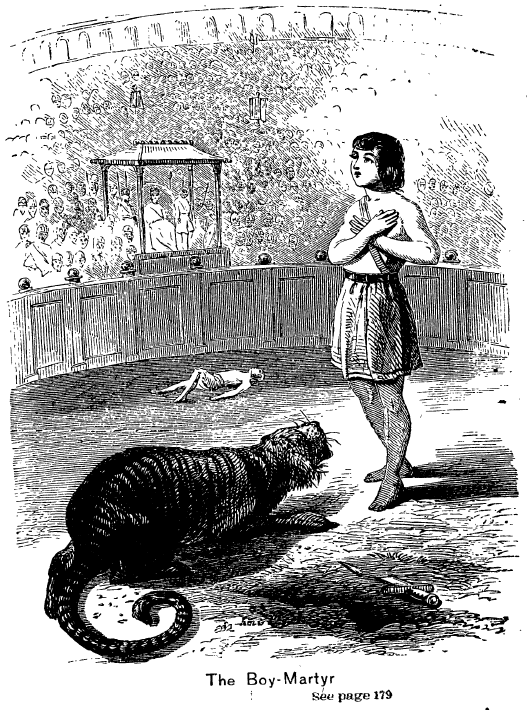THE MARTYR OF THE CATACOMBS
A TALE OF ANCIENT ROME
If after the manner of men I have fought with beasts at Ephesus, what advantageth it me, if the dead rise not?--ST. PAUL
ILLUSTRATED
NEW YORK: HUNT & EATON
CINCINNATI: CRANSTON & CURTS
CONTENTS.
I. THE COLISEUM
II. THE PRETORIAN CAMP
III. THE APPIAN WAY
IV. THE CATACOMBS
V. THE CHRISTIAN'S SECRET
VI. THE CLOUD OF WITNESSES
VII. THE CONFESSION OF FAITH
VIII. LIFE IN THE CATACOMBS
IX. THE PERSECUTION
X. THE ARREST
XI. THE OFFER
XII. POLLIO'S TRIAL
XIII. THE DEATH OF POLLIO
XIV. THE TEMPTATION
XV. LUCULLUS
Illustrations.
THE BOY MARTYR
PLAN OF THE CATACOMBS
A PASSAGE IN THE CATACOMBS
THE COLISEUM
THE COLISEUM.
"Butchered to make a Roman holiday."
It was a great festival day in Rome. From all quarters vast numbers of people came pouring forth to one common destination. Over the Capitoline Hill, through the Forum, past the Temple of Peace and the Arch of Titus and the imperial palace; on they went till they reached the Coliseum, where they entered its hundred doors and disappeared within.
There a wonderful scene presented itself. Below, the vast arena spread out, surrounded by the countless rows of seats which rose to the top of the outer wall, over a hundred feet. The whole extent was covered with human beings of every class and every age. So vast an assemblage gathered in such a way, presenting to view long lines of stern faces, ascending far on high in successive rows, formed a spectacle which has never elsewhere been equaled, and which was calculated beyond all others to awe the soul of the beholder. More than one hundred thousand people were gathered here, animated by one common feeling, and incited by one single passion. It was the thirst for blood which drew them hither, and nowhere can we find a sadder commentary on the boasted civilization of ancient Rome than this her own greatest spectacle.
Here were warriors who had fought in foreign wars and were familiar with deeds of valor, yet they felt no indignation at the scenes of cowardly oppression displayed before them; nobles of ancient families were here, but they could find in these brutal shows no stain upon their country's honor. Philosophers, poets, priests, rulers, the highest as well as the lowest in the land, crowded these seats; but the applauding shout of the patrician was as loud and as eager as that of the plebeian. What hope was there for Rome when the hearts of her people were, universally given up to cruelty and brutal oppression?
Upon a raised seat in a conspicuous part of the amphitheater was the Emperor Decius, near whom the chief people among t
